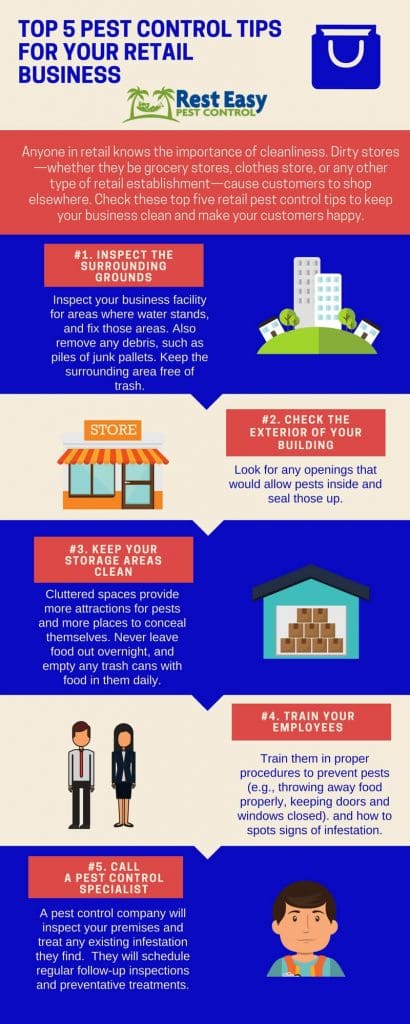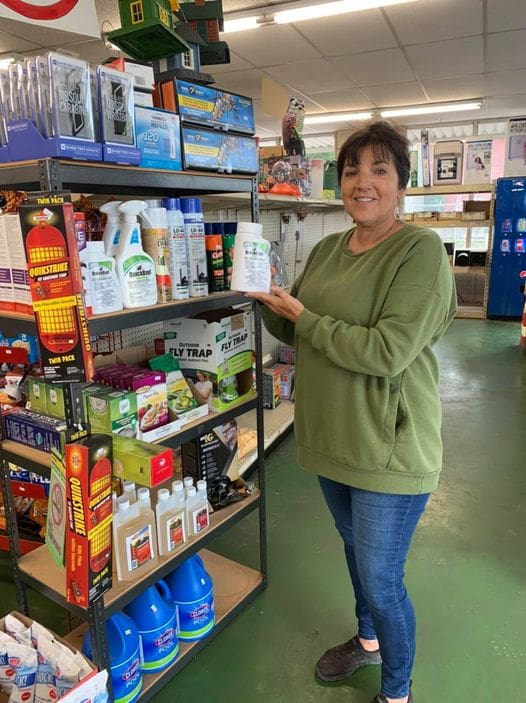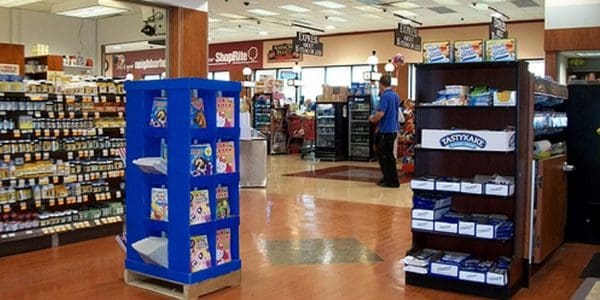If you’re a retail store owner, you know that pests can be a major headache. From rodents scurrying through the aisles to insects contaminating your products, these unwanted visitors can wreak havoc on your business. In this article, we’ll explore the challenges of pest control in retail stores and provide you with practical solutions to keep your store pest-free. Whether you’re dealing with a current infestation or looking to prevent one in the future, we’ve got you covered. Get ready to take back control of your store and create a welcoming shopping environment for your customers.

Common Pests in Retail Stores
Rodents
Rodents, such as rats and mice, are commonly found in retail stores. These pests are attracted to the abundance of food and shelter provided by the store environment. Not only can rodents cause damage to products and infrastructure, but they can also transmit diseases through their droppings and urine. It is crucial to implement effective pest control measures to prevent rodent infestations.
Cockroaches
Cockroaches are resilient pests that can easily infest retail stores. They are attracted to food sources, warmth, and moisture, making retail environments perfect breeding grounds for them. These insects can contaminate food and products with their droppings and saliva, posing health risks to both customers and staff. Prompt action should be taken to eliminate cockroach infestations and prevent their recurrence.
Flies
Flies are a common nuisance in retail stores, especially those located near food establishments. These pests can quickly multiply and contaminate food and surfaces with disease-causing bacteria. The presence of flies can also impact the shopping experience, making customers uncomfortable and leading to dissatisfaction. Effective fly control methods should be implemented to address this issue.
Ants
Ants are attracted to sugary and greasy substances commonly found in retail environments. They can infiltrate stores through cracks and crevices, causing headaches for both customers and business owners. Ants can contaminate food products, damage packaging, and create unsightly trails. It is important to promptly address ant infestations to maintain a clean and professional store environment.
Termites
While termites are not commonly associated with retail stores, they can still pose a threat. These silent destroyers can wreak havoc on the infrastructure and wooden fixtures within a store, causing significant damage and potential safety hazards. Regular inspections and preventive measures should be taken to protect retail stores from termite infestations.
Signs of Pest Infestation
Droppings
One of the most common signs of a pest infestation in retail stores is the presence of droppings. Rodents and cockroaches, in particular, leave behind small, pellet-like droppings that can be found near food storage areas, shelves, and hidden corners. Regular inspection and cleaning can help identify and remove these droppings.
Gnaw Marks
Gnaw marks on packaging, wires, and wooden structures are indicative of rodent infestations. These pests have sharp teeth that they use to chew through materials, causing damage to products and infrastructure. Identifying and repairing gnaw marks promptly can prevent further damage and discourage rodents from returning.
Nesting Materials
The discovery of nesting materials, such as shredded paper or fabric, is a clear indication of a pest infestation. Rodents and birds, in particular, use these materials to build their nests in hidden areas of retail stores. Removing these materials and ensuring proper sanitation can help eliminate the pests’ breeding grounds.
Foul Odors
Unpleasant and foul odors in retail stores can be a sign of a pest infestation. The presence of dead pests, urine, or droppings can emit strong odors that are difficult to ignore. Identifying the source of the odor and taking appropriate pest control measures is necessary to restore a fresh and inviting atmosphere in the store.
Visible Pests
Perhaps the most obvious sign of a pest infestation is the sighting of live pests. Whether it’s spotting rodents scurrying across store shelves or flies buzzing around food displays, visible pests should be addressed immediately. Prompt action can prevent further infestation and protect the store’s reputation.

Health and Safety Risks
Contamination of Food and Products
Pest infestations in retail stores pose a significant risk of food and product contamination. Rodents and insects can easily access and contaminate food items, spreading bacteria and pathogens that can lead to foodborne illnesses. This contamination can result in severe health consequences for customers and legal repercussions for the store.
Spread of Diseases
Pests like rodents, cockroaches, and flies are known carriers of various diseases and pathogens. Their presence in retail stores increases the risk of disease transmission to both customers and employees. Common diseases spread by pests include salmonella, E. coli, and Hantavirus. Efforts should be made to eliminate pests and mitigate the health risks associated with their presence.
Allergies and Asthma
Pests can trigger allergies and exacerbate asthma symptoms in individuals who are sensitive to their presence. Cockroaches, in particular, produce allergens that can cause respiratory issues. For customers with pre-existing allergies or asthma, exposure to pests in a retail store can lead to discomfort, reduced satisfaction, and potential health complications.
Customer Dissatisfaction
A pest infestation in a retail store can significantly impact customers’ perception of the establishment. Seeing pests or encountering signs of infestation can create a negative impression, leading to a loss of trust and decreased customer satisfaction. Additionally, customers may opt to take their business elsewhere if they feel that the store does not prioritize cleanliness and pest control.
Importance of Pest Control in Retail Stores
Protecting Brand Reputation
Maintaining a reputation for cleanliness and hygiene is crucial for retail stores. A pest infestation can tarnish the brand image and deter customers from shopping there. Implementing effective pest control measures demonstrates a commitment to providing a safe and pest-free environment, thus safeguarding the store’s reputation.
Ensuring Compliance with Regulations
Retail stores are subject to various regulations and health codes that require a pest-free environment. Non-compliance can result in fines, penalties, or even closure. By implementing a comprehensive pest control plan, retail store owners can ensure compliance with regulations and eliminate any potential legal risks.
Maintaining a Clean and Hygienic Environment
Pest control is an essential part of maintaining a clean and hygienic environment in retail stores. Customers expect a high standard of cleanliness and hygiene when they shop, and the presence of pests can deter their confidence in the store’s standards. Regular pest control measures help ensure a pleasant and inviting shopping experience.
Preventing Damage to Products and Infrastructure
Pests can cause significant damage to retail store products and infrastructure. Rodents, in particular, can chew through packaging, wires, and insulation, leading to product spoilage, electrical issues, and potential safety hazards. Implementing preventive pest control measures helps protect the store’s assets and infrastructure from costly damage.

Preventive Pest Control Measures
Maintaining Cleanliness and Sanitation
Regular cleaning and proper sanitation practices are essential in preventing pest infestations. This includes regular sweeping and mopping of floors, keeping shelves and storage areas clean, and promptly disposing of waste. Minimizing potential food and water sources for pests helps reduce their attraction to the store.
Monitoring and Sealing Entry Points
Inspecting the store for potential entry points is crucial in Preventing pests from infiltrating the premises. This includes sealing cracks and gaps in walls, doors, and windows, as well as ensuring proper installation of screens and weatherstripping. Regular monitoring and maintenance of these entry points can help keep pests out of the store.
Proper Storage and Waste Management
Properly storing food and products is essential in preventing pest infestations. This includes using sealed containers and properly organizing stock to minimize hiding spots for pests. Additionally, implementing effective waste management practices, such as sealing trash containers and disposing of waste regularly, helps reduce the attractiveness of the store to pests.
Regular Inspections and Maintenance
Regular inspections by trained professionals are crucial in identifying any signs of pest activity or potential vulnerabilities in the store. This includes monitoring for pest droppings, checking for gnaw marks, and identifying potential breeding grounds. Prompt action can be taken to eliminate pests and address any maintenance or structural issues that may contribute to infestations.
Organic Pest Control Options
Essential Oils
Certain essential oils, such as peppermint, tea tree, and lavender, are known to repel pests due to their strong scents. Mixing these oils with water and using them in spray bottles can create natural repellents that can be used in retail stores. However, it is important to note that essential oils may not be as effective in severe infestations and may require more frequent application.
Biological Controls
Biocontrol involves using natural predators or parasites to control pest populations. For example, introducing certain species of predatory insects or nematodes can help control pests like flies or aphids. This method can require specialized knowledge and expertise to implement effectively in retail store environments, and it may not be suitable for all pest species.
DIY Traps and Baits
Various DIY traps and baits are available for pest control, and they can be used in retail stores as part of an organic approach. Sticky traps for capturing flies or cockroaches, homemade ant bait using borax and sugar, or mouse traps using non-toxic materials are examples of DIY methods that can be employed. However, it is important to use these traps and baits safely and correctly to ensure effectiveness.
Ultrasonic Repellers
Ultrasonic repellers emit high-frequency sound waves that are inaudible to humans but can be irritating to pests. These devices can be used in retail stores to deter pests without the use of chemicals. However, their effectiveness can vary depending on the pest species and the specific environment. Regular inspection and maintenance of ultrasonic repellers are necessary to ensure their proper functioning.

Chemical Pest Control Methods
Insecticides
Insecticides are chemical compounds specifically designed to kill or repel insects. They come in various forms, including sprays, dusts, and baits. The choice of insecticide depends on the pest species and the severity of the infestation. It is important to follow the manufacturer’s instructions and safety guidelines when using insecticides to control pests in retail stores.
Rodenticides
Rodenticides are chemical baits or poisons used to control rodent populations. They are typically placed in bait stations or traps to target rodents specifically. When using rodenticides in retail stores, it is essential to follow safety guidelines and ensure that they are placed in areas inaccessible to customers and non-target animals.
Fumigation
Fumigation involves the use of specialized chemicals that release gas to eliminate pests. This method is often used for large-scale pest infestations in retail stores. Fumigation should only be performed by trained professionals who can ensure the safe and effective use of chemicals, as it can be hazardous if not conducted correctly.
Residual Sprays
Residual sprays are insecticides that are applied to surfaces, leaving behind a residue that remains effective for an extended period. This method is commonly used for targeted pest control, such as treating areas where pests are likely to travel or congregate. Proper application and adherence to safety guidelines are essential when using residual sprays in retail stores.
Professional Pest Control Services
Hiring Licensed Exterminators
Engaging the services of licensed pest control professionals is crucial to effectively address pest infestations in retail stores. These professionals have the knowledge, expertise, and access to specialized tools and products to effectively eliminate pests. Regular inspections and treatments by licensed exterminators can help ensure ongoing pest control and prevent future infestations.
Customized Pest Management Plans
Professional pest control services can develop customized pest management plans tailored to the specific needs and challenges of retail stores. These plans consider the store’s layout, inventory, and pest history to create a comprehensive approach to pest control. Regular evaluations and adjustments to the plan help ensure its effectiveness in maintaining a pest-free environment.
Integrated Pest Management (IPM)
Integrated Pest Management is an approach that focuses on long-term pest prevention and management, using a combination of methods that minimize reliance on chemical pesticides. IPM often includes strategies such as regular monitoring, implementing preventive measures, and employing biological controls. Retail stores can benefit from IPM by prioritizing sustainability and minimizing the impact on the environment.
Eco-Friendly Pest Control Options
Many professional pest control services offer eco-friendly or green pest control options. These methods prioritize the use of non-toxic or lower toxicity products and focus on minimizing harm to the environment. Retail stores looking to align with sustainability goals or meet specific regulations can opt for these eco-friendly pest control solutions.

Training and Education for Staff
Identifying Common Pests
Providing training to retail store staff on how to identify common pests is essential in detecting infestations early. Staff should be taught to recognize signs of pest activity, such as droppings, gnaw marks, or unusual odors. With this knowledge, staff can promptly report pest sightings to management or pest control professionals for immediate action.
Reporting Pest Sightings
Creating an environment where staff feel comfortable reporting pest sightings is crucial in maintaining effective pest control. Staff should be encouraged to report any signs of pests promptly so that appropriate measures can be taken to address the issue. Quick reporting can help prevent infestations from spreading and minimize any potential damage or health risks.
Proper Handling of Chemicals
Staff should be trained on proper handling and storage of pest control chemicals to ensure their safety. This includes understanding the correct usage of pesticides, following safety guidelines, and utilizing personal protective equipment when necessary. Proper chemical handling can prevent accidents and minimize the risk of exposure to staff and customers.
Understanding Preventive Measures
Education and training on preventive measures are essential to create a proactive pest control culture within retail stores. Staff should understand the importance of cleanliness, storage practices, and regular inspections to prevent pests from infiltrating the store. By promoting a collective effort in maintaining a pest-free environment, staff can contribute to the overall success of pest control efforts.
Pest Control Product Reviews
Best Mouse Traps for Retail Stores
When it comes to controlling mice in retail stores, choosing the right mouse trap is crucial. An effective mouse trap should be humane, reliable, and discreet. Consider traps like snap traps with a quick and strong mechanism or catch-and-release traps that allow for the safe removal of mice. Look for durable and easily cleanable traps that can be discreetly placed in areas frequented by mice.
Top-Rated Roach Killers for Commercial Use
For retail stores dealing with cockroach infestations, selecting an effective roach killer is vital. Look for roach killers that are fast-acting, long-lasting, and safe for use in commercial spaces. Gel baits, sprays, or dusts that specifically target cockroaches are popular choices. Make sure to choose products that are labeled for commercial use and follow the instructions for optimal results.
Effective Fly Control Products for Supermarkets
Flies can be a major concern in supermarkets, as they pose a risk of contaminating food and repelling customers. Effective fly control products for supermarkets include fly traps, ultraviolet light traps, or sticky fly ribbons. Look for products that are non-toxic, easy to maintain, and designed to attract and trap flies without using harmful chemicals.
Ant Baits and Sprays for Retail Shelves
When dealing with ant infestations on retail shelves, it is important to use ant baits and sprays that are safe for use around food and customers. Look for ant baits that contain non-toxic ingredients like borax or sugar-based baits that can attract and eliminate ants. Additionally, non-residual sprays can be used to target ants directly without leaving behind potentially harmful residues.
Termite Control Solutions for Warehouses
If termites are a concern in retail warehouses, effective termite control solutions are necessary to protect the infrastructure and inventory. Consider termite baiting systems that can help eliminate termite colonies, as well as liquid termiticides that provide long-lasting protection. Consulting with professional pest control services is recommended to identify the most suitable termite control solutions for warehouses.
In conclusion, pest control in retail stores is crucial for maintaining a clean, hygienic, and inviting environment. Implementing preventive measures, utilizing organic or chemical pest control methods, and seeking professional services when needed are all important aspects of effectively managing pests. By prioritizing pest control, retail stores can protect their brand reputation, ensure compliance with regulations, maintain customer satisfaction, and prevent damage to products and infrastructure.

I am Randy, the author behind PestControld.com. Drawing from decades of experience, I aim to provide valuable insights, expert advice, and practical recommendations to help you make informed decisions when assessing viable pest control solutions.